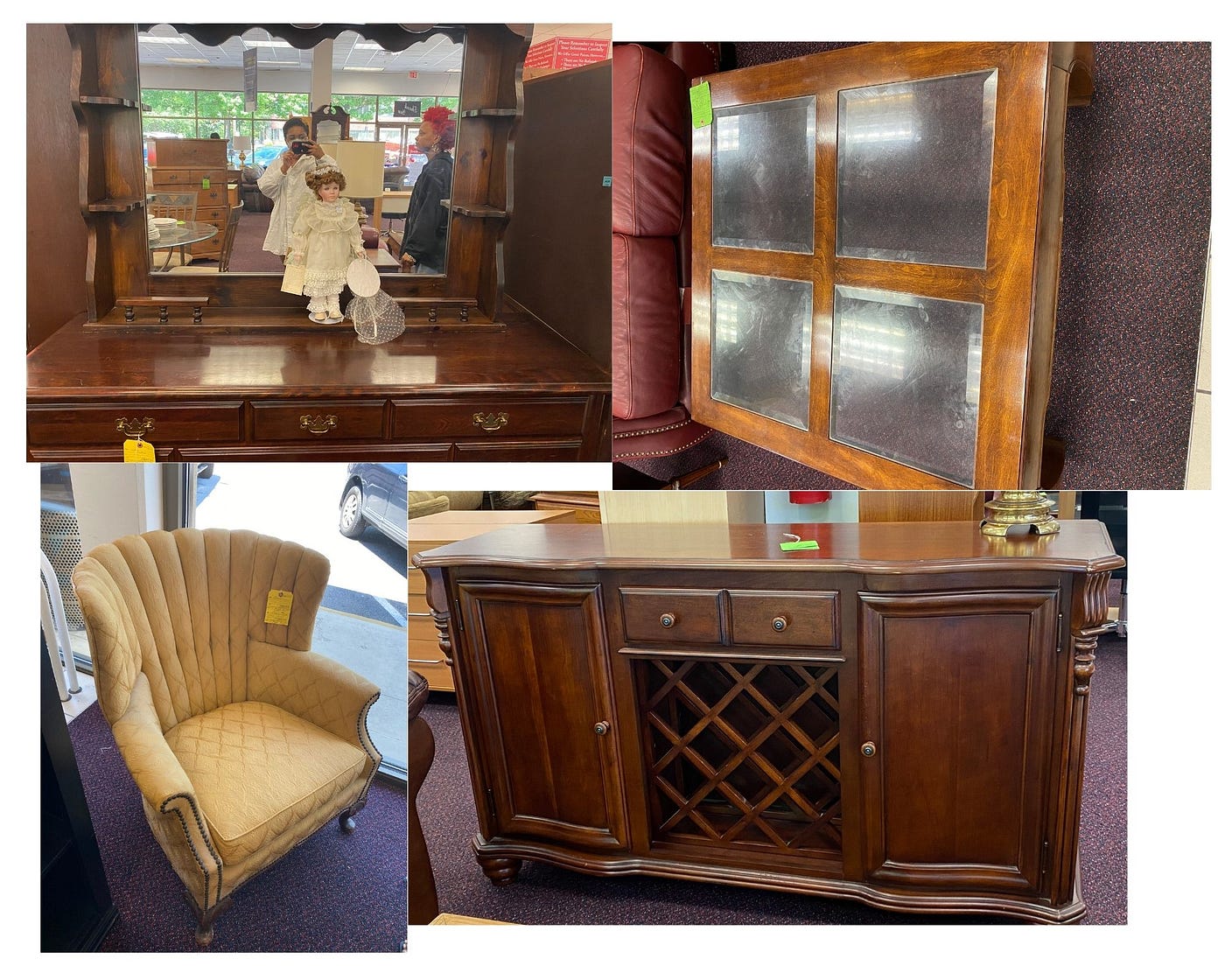A second life: How secondhand furniture is being used in new homes
By Mary Bridges. Mary Bridges is a fiction writer with a love of horror. She is currently researching for a new story.

This article was submitted by a contributing writer. To have an article published with The Connector, email editor@scadconnector.com.
My home is my favorite place to be. I’m a homebody, so becoming one with my couch is a regular activity for me. It just became more permanent than I wanted in 2020. At the height of the pandemic, people slowly began to realize that COVID-19 was not going to be over in a couple of months. Eating, sleeping, socializing and working, now done in one space that seemed to get smaller as the days went on. With their lives now isolated to their homes and all their interactions through screens, people began to prioritize their homes. “Now we are putting more time and energy into our homes, designing them for the new lifestyle of today,” Taniya Nayak tells Today.
With the current workforce, apartment renters and new homeowners being millennials, some ingenuity was required for these upgrades. People gravitated to TikTok, an app that gained significant popularity during the pandemic, for tips on how to upgrade their living spaces. Users recommended tape-up wallpaper, tape-down tiles and various temporary decorations for renters. Ideas for homeowners ranged from dyeing couch covers to building cat enclosures for furry friends. The way people made their homes comfortable for themselves and their families, either human or pet, was especially made possible with secondhand furniture. “I think thrifting for furniture and really thrifting in general as an inexpensive tool for those of low-income communities to fill their homes with furniture.” Kellie Edmund, a local student and friend, said. “When I got my first apartment in Atlanta, I didn’t have a steady job yet, so I purchased all of my furniture at Goodwill and on Facebook Marketplace.”
The trend of secondhand and vintage shopping for clothes has been growing for years. As the amount of people decorating their own living spaces also grows, it is natural that it would transfer to furniture shopping. Secondhand stores, online marketplaces and estate sales were where many found furniture in great condition but in need of repairs and cleaning.
I’ve frequented some stores before with my mom but normally found myself gravitating towards the clothing section. At the Salvation Army on Northside Drive, there was furniture that looked straight from a catalog. Not a scratch or anything more than a speck of dust. A golden chair that was once in someone’s grandmother’s living room, wrapped in plastic. A wooden vanity with a vintage doll in a white dress. Coffee tables looked pristine.

At the Goodwill, not even ten minutes away from Salvation Army, the furniture section is at the back of the store. Items are tagged with white tags with perforated lines to remove. From where I stood at the entrance, I could see a beautiful wooden armoire. I speed-walked through the store with Edmund who had tagged along, trying to keep up.

In one section, there were three sets of matching chairs. A set that caught my eye was a pair of two black jacquard fabric chairs with a floral pattern. Minimal snagging or damage to the fabric. Across from the chairs was a brown suede couch with gold buttons on the bottom. It looked worn-in and used but not torn or stained. A cherry wood table with three drawers missing. The missing drawers sound bad but the one that remained was lined with green felt, resembling a poker table. If you replace the drawers or removed the last one, nobody would be able to tell and the table could be repurposed.
Repairing and updating furniture is something my mom is familiar with. She changes the furniture in our living room around at least once a year. She adds a new piece too. A side table for the recliner or a new dog bed for Scout, our westie, she would find some way to put it in that room. The first place she would look was second-hand and discount stores. My mom is not one to let something go to waste and knows that people constantly donate brand-new items. “I found your daddy’s recliner at Bargain Hunt down the street,” She told me when asked about her best finds. “And that lawn mower I had your uncle doing the yard with. Under $550 or something, for that thing. Brand new too.”
My mom took in a project for our kitchen around 2017. She added a bar to the island in the kitchen, using oak wood. People tend to recommend taking up small projects yourself, claiming affordability. Home projects like that are only affordable if you have all the tools needed and the experience to do it to avoid unnecessary mistakes. Otherwise, the cost is the same as paying someone to do it right the first time. Some become concerned for the resale value of a home, but that was not a priority for her. She was concerned about counter space.
Mom got a piece of wood from Home Depot, along with a Minwax wood stain in “special walnut 224.” She had her own tools like a sander and my sister and I to help. She was able to complete the project in a couple of days.
Projects like this are one’s people started taking on during the pandemic to fix up their homes to their liking. Making a home out of few resources is a task many must do, especially now with rising costs of everything. Some people need a little extra help in achieving that goal.
Furnish with Love, a non-profit organization that takes gently used furniture and updates it for families to use. Started by Kathleen Kelly, Furnish with Love’s goal is to “transform empty housing into uplifting homes for families coming out of homelessness.” They are based in Decatur and have a warehouse where they house all their items.
They accept donations of select gently used or like-new home items. They use them to furnish the homes of families who need help and for a showroom. They have the occasional pop-up sale that sells items that are donated when they have a surplus of donations. They use these funds to then buy items that homes need that they were not able to receive by donations.
“We don’t repair the furniture because we don’t have the skills to repair the furniture,” Kelly told me. “ We ask that the furniture is new or like-new so that we can repaint it.” She explained that the kind of furniture they accept seems so strict because there are things to take into consideration with some items. “A scratch, a dent, anything small that we can cover up with a fresh coat of paint, we’ll paint to match the colors in the homes.”
The organization works with a significant number of volunteers from the community who are open to helping them create these homes for the families. “It’s really grown organically from people talking about it,” she said. “The design community is huge in Atlanta and there isn’t a way for this community to share their work philanthropically and we are able to help them share their work and we can help these families.”
This sense of home was something people had put on the backburner before the pandemic but quickly shifted to become the main priority. The use of secondhand items has made that possible for many people. Young people and families whose lives were secluded in their houses. The way people will move forward has changed forever and it might never go back, possibly for the better.























